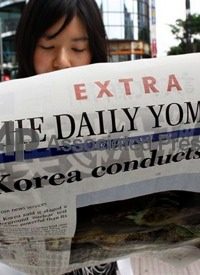
Following the April 5 missile launch and North Korea’s May 25 nuclear test, the UN Security Council on June 12 unanimously approved stringent new sanctions against North Korea, including a tighter arms embargo and new financial restrictions. The council also demanded that North Korea "not conduct any further nuclear test or any launch using ballistic missile technology" and imposed a series of measures on North Korea that include tougher inspections of cargo suspected of containing banned items related to the country’s nuclear and ballistic missile activities, a tighter arms embargo with the exception of light weapons, and new financial restrictions.
A New York Times report observed that while the North Koreans routinely test such short-range missiles, these latest firings raised speculation that the communist nation might soon launch a long-range ballistic missile in defiance of the Security Council’s ban.
During the third week of June, Japanese media reported that the North Koreans appear to be preparing for a long-range missile test around July 4, and a Japanese defense ministry paper developed a scenario wherein Pyongyang could fire a missile towards Hawaii. President Obama addressed this possible threat during an interview with CBS News’s Harry Smith taped on June 19 and broadcast June 22 on "The Early Show."
"This administration and our military is fully prepared for any contingencies," Obama said during the interview . "I don’t want to speculate on hypotheticals," the president continued, "But I want … to give assurances to the American people that the t’s are crossed and the i’s are dotted in terms of what might happen."
"What we’re not going to do is to reward belligerence and provocation in the way that’s been done in the past," said Obama.
However, Seoul’s YTN television news network said on July 2 that there are no signs of an imminent long-range missile launch.
The most recent test files were not unexpected, since in June North Korea warned other nations to keep their shipping away from a no-sail zone extending 68 miles off its east coast between June 25 and July 10, saying it was conducting a military drill.
Reuters quoted State Department spokesman Ian Kelly in Washington, who called the latest missile firings "not helpful" and "dangerous." "They need to cut out these kind of provocative actions and return to denuclearization talks," said Kelly at a news briefing.
Japan’s Kyodo News Agency quoted the nation’s Prime Minister Taro Aso’s reaction to these latest tests: "We have often warned that such a provocative act is not beneficial for North Korea’s national interest."
And a U.S. official told CNN that "the missile firings come as no surprise." "The North has been carrying out provocative acts for some time," said the official, who did not want to be named for security reasons. "North Korea needs to stop this type of activity and return to the process of bringing about a denuclearization of the Korean peninsula."
One consequence of North Korea’s continual provocative actions is that neighboring China, the world’s largest communist nation and (with Russia) one of only two nations in the world that might present a formidable military threat to the West, appears to be relatively moderate by comparison. The Chinese government announced on July 2 that it was sending its envoy to meet with four of the "six-party talks" members: South Korea, Japan, Russia, and the United States. North Korea, the sixth party, was not on the itinerary.
"China has consistently advocated dialogue and consultation, and achieving denuclearization of the Korean peninsula through the six-party talks process," the nation’s Foreign Ministry spokesman Qin Gang said in a news briefing.
The interaction between China and its junior partner North Korea (which could not exist without Chinese cooperation) sometimes resembles the dialogue between a puppet master and his very naughty puppet. It is easy to forget that there is no disagreement at all and who is really controlling the bad boy with the hinged jaw and wooden head.
Photo: AP Images



